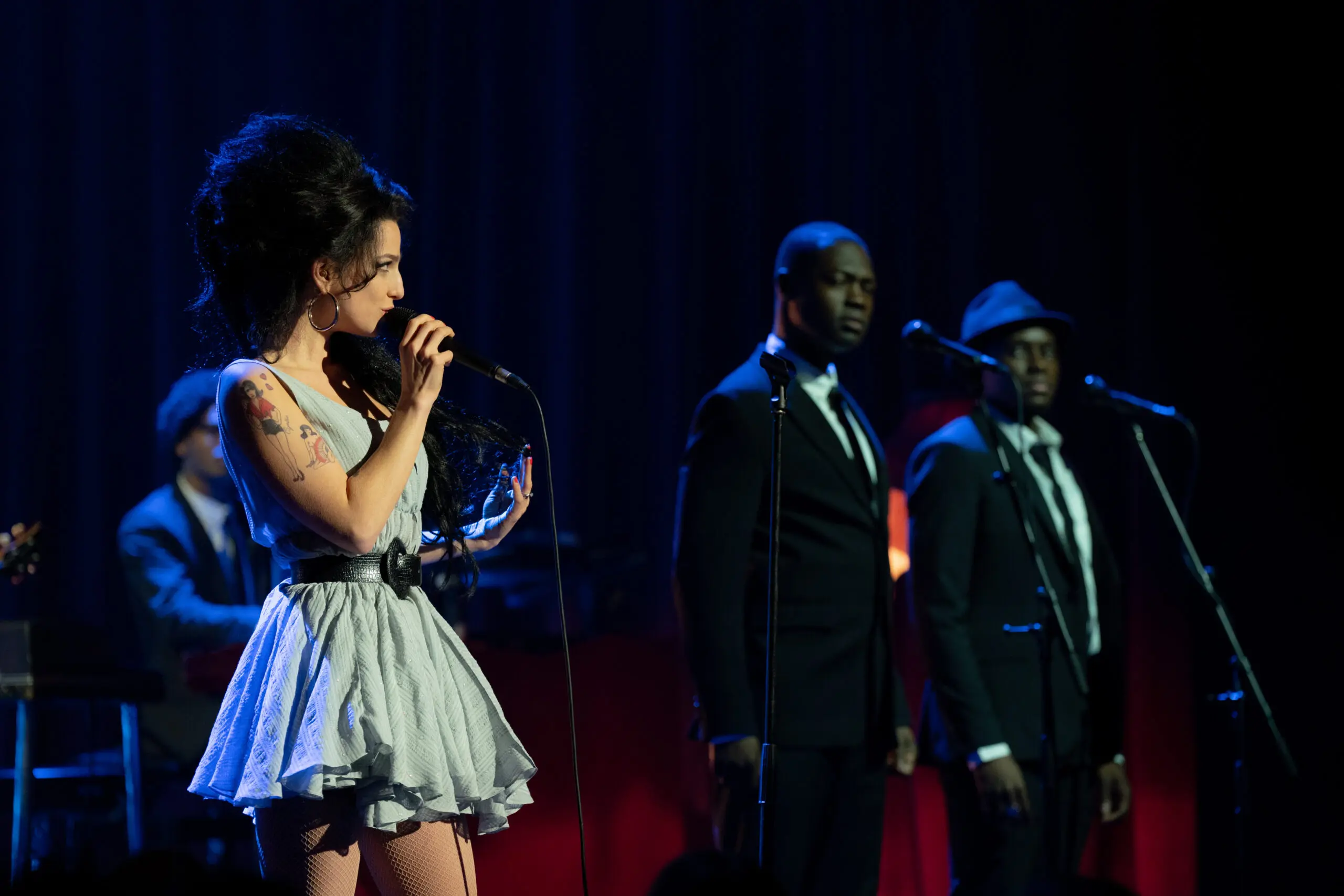Major life decisions can be quite dramatic. Weighing the pros and cons of each one isn’t something to be taken lightly. And if the choice is made poorly, one could easily live a lifetime of regret, full of too many traumatic what-if moments.
You can only learn from your past mistakes and if you’re lucky enough, you might even get the opportunity to make a different decision in the future. I’ve been experiencing one recently, and after watching Back to Black, I started to wonder how many of these tough decisions we actually get to make within our entire lives… and how Amy Winehouse seemingly made the wrong decision, just about each and every time throughout her way-too-short life.
Back to Black chronicles Winehouse’s musical slingshot to the proverbial pop-culture sun (deservedly winning multiple Grammy Awards) and almost just as quickly, her fall from grace.
Much of Sam Taylor-Johnson’s film focuses on the early years of Amy, a young English lady who enjoys singing at family functions just as much as she imbibes in the occasional mixed drink. Growing up with Jewish parents, jazz and soul music were staples in her every-day life, eventually becoming the backbone for her own musical choices. But just as influential, if not more so, were the inner demons of her personal life.
I won’t recount step-for-step Winehouse’s poor life choices, but they do involve deadly games with addiction, tangled with mental and physical health issues being under the influence of Blake Fielder-Civil.
As a huge fan of her music from the outside looking in, she was far from perfect, but this on-again-off-again romantic relationship that inspired in part, the world’s seventh biggest-selling album of 2008 that eventually gained platinum status within the music industry eventually became a cautionary tale of bad decisions. And this one overbearing authority that she gave the most power in her life does not receive enough criticism in this adaption of the musician’s life, making the entire film feel incomplete.
Throughout this film, the mere presence of BF-C (played by Jack O’Connell) feels inconsequential, to say the least, when the opposite was true. Fans of Behind the Music (as well as other docuseries) can tell when musicians’ major life events are ignored, and I’ve seen more than a few. For a more informative look at the musician’s life, Amy was a pretty good documentary distributed by A24 (my favorite!) that was more objective about who was to blame, which went on to win the Best Documentary Feature Film trophy at the 88th Academy Awards.
The opposite feels true for Back to Black.
Director Sam Taylor-Johnson attempts to take a page from the Straight Outta Compton playbook, by not demonizing the real-life villain here, perhaps in hopes of preventing later lawsuits (which actually happened after that movie’s release). In actuality, Blake Fielder-Civil was a very, very bad influence on Amy and many researchers have concluded he dragged her down into her own personal hell, which ultimately led to death by alcohol poisoning, robbing the world of this one-of-a-kind talent.

Be on the lookout for The Dap-Kings in BACK TO BLACK, a Focus Features release. Credit: Olli Upton/Focus Features
Besides Taylor-Johnson’s responsibility sidestepping, there’s non-chronological time shifts in the storyline that were both unnecessary, as well as out of place. Providing a backstory for individual world-renowned songs should’ve felt more authentic, but the film’s single greatest asset is Marisa Abela. An unknown actress to me until now, I didn’t recall seeing the actress’ previous performances before watching this movie. And let me tell you something, she truly shines here.
Production Designer Sarah Greenwood, as well as all of the art directors, deserve many accolades for transforming the Brighton, East Sussex-born actress into Amy, herself. And when I mention that Abela actually sings every song in the movie herself (except for one that plays on a jukebox), putting the knowledge of this Winehouse fan in question, it’s a great attribute to the presentation. She’s got a wonderful voice, and she actually looks very close to the real-life Amy with her on-screen mannerisms, which is a huge plus for a biopic.
Amy’s old-soul presence meets punk-era rebellion is on full display here, making me yearn for what could have been next for the singer’s future. While I’ve never been interested in her later rap battles that would eventually be posthumously released, I would’ve preferred to see more collaborations with The Dap-Kings, who make nothing more than a quick cameo here.
Can you imagine attending a concert that featured Winehouse, Sharon Jones and The Heavy, all bands that have collaborated with The Dap-Kings, taking a world tour together? It could have been epic! (They also worked with Muse, David Byrne, St. Vincent, Bruno Mars, Kesha and Sturgill Simpson, among others.)
Girl power — and grrrl power — is fully displayed in Back to Black, I only wish the film could have offered something more than the already-great documentary, Amy. It’s clear Winehouse made some very poor major life decisions. Depending on the film’s upcoming box-office results, maybe fans of the beehived singer will feel the same way about Sam Taylor-Johnson.
